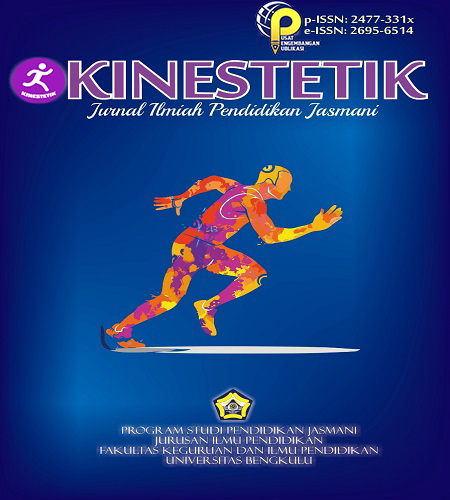Main Article Content
Abstract
This study explores the principal's leadership role in developing Muhammadiyah Nitikan Yogyakarta Elementary School's physical education teacher's competencies. The researchers used a qualitative method in the research. The researchers collected the data through collecting data from observations, interviews, and documentation. The sample is determined through purposive sampling. The number of participants in this study amounted to 10 respondents. The sample consisted of principals, curriculum time, arts and talent lecturers, physical education teachers, and students. This study concluded that the principal had made full efforts by enforcing programs and activities to develop physical education (PE) teachers' competencies at Muhammadiyah Nitikan Yogyakarta Elementary School to teach physical education effectively and master learning materials. Programs enforced to improve the competencies of physical education teachers namely as follows: 1) planning for developing the competence of PE teachers by following the Teacher Work Group (KKG) and the Subject Teacher Deliberation (MGMP); 2) Mapping the competence of teacher skills through competency tests and writing scientific articles or enforcing classroom action research (PTK); 3) Giving opportunities for PE teachers to attend sports training and seminars; 4) Direct coaching by the principal.
Keywords
Article Details
- Authors retain copyright and grant the journal right of first publication with the work simultaneously licensed under a Creative Commons Attribution-ShareAlike 4.0 (CC BY-SA) that allows others to share the work with an acknowledgement of the work's authorship and initial publication in this journal.
- Authors are able to enter into separate, additional contractual arrangements for the non-exclusive distribution of the journal's published version of the work (e.g., post it to an institutional repository or publish it in a book), with an acknowledgement of its initial publication in this journal.
- Authors are permitted and encouraged to post their work online (e.g., in institutional repositories or on their website) prior to and during the submission process, as it can lead to productive exchanges, as well as earlier and greater citation of published work (See The Effect of Open Access).
- This work is licensed under a Creative Commons Attribution-ShareAlike 4.0 International License.
References
- Bukit, B. dkk. (2017). Pengembangan Sumber Daya Manusia Teori, dimensi Pengukuran, dan Implementasi dalam Organisasi. Yogyakarta: Zahir Publishing.
- Dhuhary, A. A. (2012). Peningkatan Kompetensi Guru Pendidikan Jasmani Olahraga Dan Kesehatan. Pendidikan Olahraga Pascasarjana UM, (1), 294–306.
- Kementerian Pendidikan dan Kebudayaan. (2012). Kebijakan Pengembangan Profesi Guru. (Https://Www.Usd.Ac.Id/f Fakultas/Pend Pendidikan/F1l3/PLPG2015/Modul/03%20 Policy% 20profesi_Modul% 20Guru% 20Kelas% 20SD-4.Pdf), Accessed 23 April 2017.
- Kementerian Pendidikan dan Kebudayaan. (2016). Panduan untuk Program Peningkatan Kompetensi dalam Mode Gabungan Tatap Muka, Online, dan Online. Online), (Https://Docs.Google.Com/Viewer?A=v&pid=sites&srcid=ZGVmYXVsdGR VbWFpbnxhcnNpcGdwb2.
- Mardapi. (2012). Pengukuran Penilaian & Evaluasi Pendidikan. Yogyakarta: Nuha Medika.
- Mardhatillah, M. & K. (2019). Musdiani & Khausar, Khausar. (2019). Analysis the role of headmaster in applying quality of education in primary school kabupaten, Aceh Barat.
- Musdiani & Khausar, Khausar. (2019). Analysis the Role of Headmaster in Applying Quality of Education in Primary School Kabupaten, Aceh Barat, (10.33258/birle.v2i3.349), 19–27.
- Muhajir. (2016b). Buku Guru Pendidikan Jasmani, Olahraga, dan Kesehatan. Pusat Kurikulum dan Perbukuan, Balitbang, Kemdikbud.
- Mulyana. (2013). Standar kompetensi dan sertifikasi guru. Bandung: PT.Remaja Rosdakarya.
- Rosyada, dede. (2013). Creative Thingking. UIN Syarif Hidayatullah Jakarta, edisi3.
- S., Bustan, Herculanus Bahari Sindju, M., & Suib. (2019). Tugas Kepala Sekolah Sebagai Pendidik Dan Pemimpin Di Sekolah Dasar. Portal Jurnal Ilmiah Universitas Tanjungpura.
- Selvi, K. (2011). Teachers’ Competencies. Cultura. International Journal of Philosophy of Culture and Axiology., 7. 167-175.
- Setyawan. (2016). Peningkatan mutu pendidikan jasmani melalui pemberdayaan teknologi pendidikan. 110–139. Jakarta Timur: Seminar Nasiolnal Olahraga 2016 Program S3 Pendidikan Olahraga Pascasarjana UNJ,.
- Sugiyono. (2019). Metode Penelitian Pendidikan Pendekatan Kuantitatif, Kualitatif, dan R@D. Bandung: Afabeta.
- Surahni. (2017). Pendidikan Jasmani, Olahraga dan Kesehatan (PJOK) sebagai Sarana Pendidikan Moral. The 6th University Research Colloquium 2017, 41–46.
- Undang-Undang Republik Indonesia nomor 23 Tahun 2014. (2014).
- Wardoyo, Cipto&Herdiani, A. (2017). No Title. Teacher Professionalism: Analysis of Professionalism Phases. International Education Studies, 10. 90. 10.
- Winarno. (2014). Evaluasi Hasil Belajar Pendidikan Jasmani Olahraga dan Kesehatan. . Malang: Universitas Negeri Malang.
References
Bukit, B. dkk. (2017). Pengembangan Sumber Daya Manusia Teori, dimensi Pengukuran, dan Implementasi dalam Organisasi. Yogyakarta: Zahir Publishing.
Dhuhary, A. A. (2012). Peningkatan Kompetensi Guru Pendidikan Jasmani Olahraga Dan Kesehatan. Pendidikan Olahraga Pascasarjana UM, (1), 294–306.
Kementerian Pendidikan dan Kebudayaan. (2012). Kebijakan Pengembangan Profesi Guru. (Https://Www.Usd.Ac.Id/f Fakultas/Pend Pendidikan/F1l3/PLPG2015/Modul/03%20 Policy% 20profesi_Modul% 20Guru% 20Kelas% 20SD-4.Pdf), Accessed 23 April 2017.
Kementerian Pendidikan dan Kebudayaan. (2016). Panduan untuk Program Peningkatan Kompetensi dalam Mode Gabungan Tatap Muka, Online, dan Online. Online), (Https://Docs.Google.Com/Viewer?A=v&pid=sites&srcid=ZGVmYXVsdGR VbWFpbnxhcnNpcGdwb2.
Mardapi. (2012). Pengukuran Penilaian & Evaluasi Pendidikan. Yogyakarta: Nuha Medika.
Mardhatillah, M. & K. (2019). Musdiani & Khausar, Khausar. (2019). Analysis the role of headmaster in applying quality of education in primary school kabupaten, Aceh Barat.
Musdiani & Khausar, Khausar. (2019). Analysis the Role of Headmaster in Applying Quality of Education in Primary School Kabupaten, Aceh Barat, (10.33258/birle.v2i3.349), 19–27.
Muhajir. (2016b). Buku Guru Pendidikan Jasmani, Olahraga, dan Kesehatan. Pusat Kurikulum dan Perbukuan, Balitbang, Kemdikbud.
Mulyana. (2013). Standar kompetensi dan sertifikasi guru. Bandung: PT.Remaja Rosdakarya.
Rosyada, dede. (2013). Creative Thingking. UIN Syarif Hidayatullah Jakarta, edisi3.
S., Bustan, Herculanus Bahari Sindju, M., & Suib. (2019). Tugas Kepala Sekolah Sebagai Pendidik Dan Pemimpin Di Sekolah Dasar. Portal Jurnal Ilmiah Universitas Tanjungpura.
Selvi, K. (2011). Teachers’ Competencies. Cultura. International Journal of Philosophy of Culture and Axiology., 7. 167-175.
Setyawan. (2016). Peningkatan mutu pendidikan jasmani melalui pemberdayaan teknologi pendidikan. 110–139. Jakarta Timur: Seminar Nasiolnal Olahraga 2016 Program S3 Pendidikan Olahraga Pascasarjana UNJ,.
Sugiyono. (2019). Metode Penelitian Pendidikan Pendekatan Kuantitatif, Kualitatif, dan R@D. Bandung: Afabeta.
Surahni. (2017). Pendidikan Jasmani, Olahraga dan Kesehatan (PJOK) sebagai Sarana Pendidikan Moral. The 6th University Research Colloquium 2017, 41–46.
Undang-Undang Republik Indonesia nomor 23 Tahun 2014. (2014).
Wardoyo, Cipto&Herdiani, A. (2017). No Title. Teacher Professionalism: Analysis of Professionalism Phases. International Education Studies, 10. 90. 10.
Winarno. (2014). Evaluasi Hasil Belajar Pendidikan Jasmani Olahraga dan Kesehatan. . Malang: Universitas Negeri Malang.
